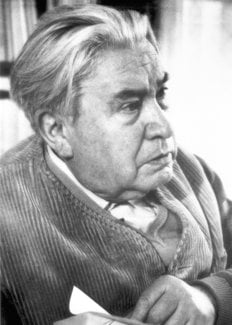Jaroslav Seifert
Biographical

Jaroslav Seifert was born on 23 September 1901 into a working-class family living in Zizkov, a suburb of Prague. He attended secondary school and soon began devoting himself to writing poetry and to journalism. He made his debut in 1918; he published his first collection of poems in 192 1. He belonged to the extreme left wing of the Social Democratic Party, which, in 1921, was to form the core of the Communist Party in newly formed Czechoslovakia. He became an editor of communist newspapers and magazines (Rovnost, Srsatec, Reflektor) while, at the same time, working at the communist publishing house and bookstore. In the 1920s he was a leading representative of the Czechoslovakian artistic avant-garde; he served on the editorial staffs of several of its publications. He translated from the French (Apollinaire, Verlaine, and others). In March 1929, together with six other important communist writers, he signed a manifesto protesting against Bolshevik tendencies in the new leadership of Czechoslovakia’s Communist Party, and together with his fellow signers, he was expelled from the party. From 1930, he served in various editorial posts within the social democratic press (Pestré kvety, Ranní noviny). During the German occupation, he was editor of the daily Národní práce and after 1945, of the trade-union daily Práce. During the years 1945-1948, he edited the literary monthly Kytice. Since 1949, when he was forced to leave journalism, he has devoted himself exclusively to literature. In 1936, 1955, and 1968, his poetry was awarded state prizes. In 1967, he was designated National Artist. In 1968, he was elected to the post of Chairman of the Czechoslovakian Writers’ Union. During the years 1969-1970, he was Chairman of the Czech Writers’ Union.
Jaroslav Seifert died in 1986.
This autobiography/biography was written at the time of the award and first published in the book series Les Prix Nobel. It was later edited and republished in Nobel Lectures. To cite this document, always state the source as shown above.
Jaroslav Seifert died on January 10, 1986.
Nobel Prizes and laureates
Six prizes were awarded for achievements that have conferred the greatest benefit to humankind. The 14 laureates' work and discoveries range from quantum tunnelling to promoting democratic rights.
See them all presented here.
